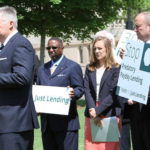Posted: 8/20/04
Coalition criticizes Bush campaign for recruiting in churches
By Robert Marus
ABP Washington Bureau
WASHINGTON (ABP)–A broad group of mainline and evangelical Protestant leaders has issued a statement criticizing President Bush's re-election campaign for attempting to recruit voters through churches.
Fifteen seminary professors and retired pastors–seven of them Baptists–released the statement to reporters. It referred to recent revelations that the Bush-Cheney campaign has asked for help from volunteers who are members of conservative churches in crucial “swing states.”
The campaign asked the volunteers to, among other things, recruit groups of potential Bush supporters within their congregations and turn over their church directories to campaign officials.
It also asked conservative churches to hold voter-registration drives and encouraged pastors to speak about Christian citizenship and voting.
Under the federal tax code, churches and other tax-exempt nonprofit groups are not allowed to endorse political parties or candidates.
However, legal experts say, churches are allowed to speak out on moral and social issues and conduct voter registration drives and voter education in a nonpartisan fashion.
“When certain church leaders acceded to the request of the Bush-Cheney campaign to hand over the names and addresses of their congregants, they crossed a line,” the statement reads.
“Christians, individually, should prayerfully seek God's direction when voting, but when any church leaders contend that they speak for God and have the right to tell congregants how to vote, such leaders have assumed prerogatives to which they have no right.”
It continues: “Whenever the church follows such a path, it engages in a scandalous secularizing of the sacred. Whenever political parties use the church, they invoke absolutes in the passing parade of politics. Whenever the church has engaged in partisan politics, it has compromised its moral authority.”
The statement concludes by calling on church leaders “to stand vigilant against entanglement in partisan politics,” urging both presidential candidates “to respect the integrity of all houses of worship,” and calls upon Bush to repudiate his campaign's actions, which, they contend, “violated a fundamental principle of our democracy.”
Two Baptist leaders–sociologist and speaker Tony Campolo of Eastern University near Philadelphia and James Dunn of Wake Forest Divinity School in North Carolina–drafted the document.
Dunn said they felt compelled to respond to a story in the New York Times that described a Bush campaign volunteer in a suburban St. Louis Assembly of God church who was following the campaign's protocol.
“It was bad enough for the campaigns to insensitively ask for the church directories, but it's even worse when the churches reveal the lack of sensitivity that allowed them to respond to that appeal,” Dunn said.
He said the leaders' goal in releasing the statement was “simply to reaffirm the traditional understanding of the spirit of church-state separation–not in some picky legal sense, but in the more vital understanding that it is none of the business of political parties to use the churches for their own partisan goals.”
The controversy first erupted in July, when the Washington Post reported that Bush-Cheney campaign officials in Pennsylvania were attempting to organize through “conservative churches” and had asked volunteers to provide church directories to campaign officials.
In June, the campaign hosted a reception for pastors attending the Southern Baptist Convention's annual meeting in Indianapolis.
A wide variety of religious leaders–including Richard Land, head of the SBC's Ethics and Religious Liberty Commission–condemned the tactics as overreach.
A Bush-Cheney campaign spokesperson said her camp was not encouraging churches to run afoul of the law.
“We've been very clear that the Bush-Cheney '04 campaign believes that people of faith have a right to fully participate in the political process,” Sharon Castillo said.
“The outreach we are doing is individual, peer-to-peer. We are not suggesting in any way that people of faith should gather in their places of worship to do political work.”
Asked about the religious leaders' allegations that the tactics violated the integrity of churches, Castillo said the campaign “is not using any church,” but simply is “engaging fellow citizens in the political process.”
In addition to Dunn and Campolo, the statement's signatories included Jimmy Allen, retired president of the SBC Radio and Television Commission and a former president of the Southern Baptist Convention; Hardy Clemons, retired pastor of First Baptist Church of Greenville, S.C.; Walter Shurden, a Baptist historian and professor at Mercer University in Macon, Ga.; and James Forbes, pastor of the Riverside Church in New York.
Signers also included professors from schools as diverse as Princeton University and Asbury Theological Seminary, a conservative Methodist school in Kentucky.
Even though the group contains some Democrats, Dunn said they were not trying to make a partisan statement in favor of the campaign of Bush's rival, Sen. John Kerry (D-Mass.).
“We're obviously speaking to an issue that transcends any campaign,” he said.
“And the people that are speaking to it (by signing the statement) are those who have … taught religion and social responsibility in the leading seminaries and universities in the country. So they understand what the American tradition is about partisan manipulation of organized religion.”














We seek to connect God’s story and God’s people around the world. To learn more about God’s story, click here.
Send comments and feedback to Eric Black, our editor. For comments to be published, please specify “letter to the editor.” Maximum length for publication is 300 words.